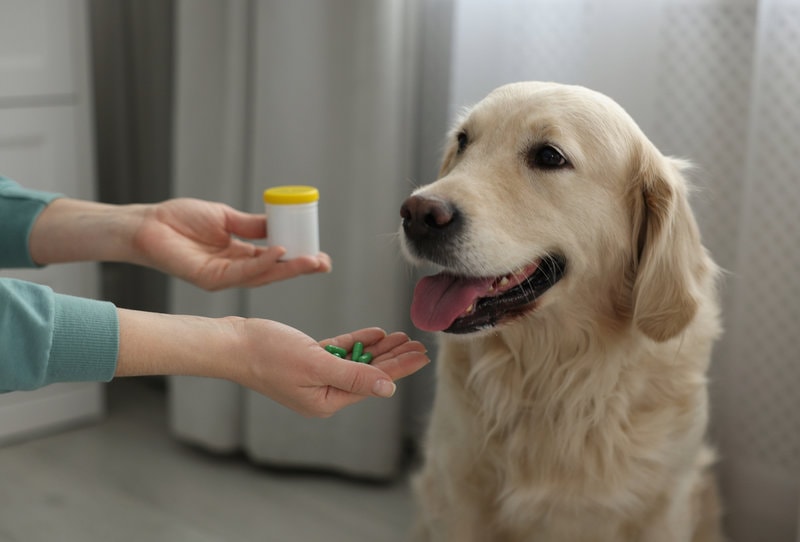Advil is a brand name for ibuprofen, a non-steroidal anti-inflammatory drug (NSAID). It reduces pain and inflammation caused by arthritis, sprains, strains, and other injuries. Advil also treats fevers and inflammation associated with other conditions. Advil is available in several forms, such as capsules, tablets, and liquid. It is also available over the counter without a prescription.
No, veterinarians don’t recommend giving dogs Advil because of the risks involved. Advil contains ibuprofen, which dogs cannot digest properly. Hence, feeding Advil to a dog may cause stomach irritation or even lead to an ulcer. It may also lead to severe adverse reactions, such as diarrhea, vomiting, kidney problems, liver damage, and in extreme cases, death.
Dogs are susceptible to illnesses and sometimes need medication to feel better. But what about over-the-counter medicines like Advil? Many pet owners believe Advil is a safe and effective pain reliever, even for their furry friends. But is it really safe? Read on to learn why you should avoid giving dogs Advil, the dangers involved, and better alternatives. First, let’s review the more serious consequences of giving dogs Advil.
What Happens If You Give A Dog Advil?

Giving a dog Advil can lead to serious side effects such as diarrhea, vomiting, and liver damage. In some cases, Advil causes seizures or even death in dogs.
Advil is one of the most commonly abused drugs in the US and is considered to be dangerous for dogs. Dogs are especially susceptible to its harmful side effects, which can take a more serious toll on their bodies.
Dogs have smaller bodies and more sensitive systems than humans, so dogs may become physically ill after taking Advil. Other dogs become psychologically impaired and can even lose their lives due to taking this drug.
What Is Advil?
Advil is a nonsteroidal anti-inflammatory drug (NSAID) that treats pain and inflammation. The Food and Drug Administration (FDA) has not approved Advil for dogs’ use. Veterinarians often prescribe pain medications to treat various conditions such as arthritis, dental pain, and fever. Only give your dog pain medications under the direction and care of a vet.
What Does Advil Do To A Dog?
As with any medication, there are potential risks associated with its use. So, always err on the side of caution and consult a veterinarian before giving your dog medication like Advil. So, what’s the verdict?
If you give your furry friend Advil, you may notice side effects such as vomiting, diarrhea, and loss of appetite. Your canine buddy may experience difficulty breathing, seizures, and kidney failure in more severe cases. If you notice any of these side effects after giving your dog Advil, seek medical attention immediately.
When administered appropriately by a vet, Advil can be a safe and effective way to relieve pain and inflammation in canines. But always talk to your veterinarian before giving this medication to your pet. They can determine the proper dosage based on your dog’s weight and health condition.
How Much Advil Can You Give My Dog For Pain?

The proper dosage of Advil for dogs varies depending on your pet’s weight and health condition. The recommended ibuprofen dosage for dogs is between 0.25 to 0.75 mg per pound of body weight, given every 12 to 24 hours.
For example, a 50-lb. dog would need between 12.5 mg to 37.5 mg of ibuprofen per day. As with any medication, it is crucial to follow the dosage instructions provided by your veterinarian.
Always consult a veterinarian before giving your dog any medication. Veterinarians determine the appropriate dosage based on your dog’s individual needs. Giving a dog too much ibuprofen can result in serious side effects. These may include gastrointestinal ulcers, stomach or intestinal bleeding, kidney failure, seizures, and difficulty breathing.
If you notice any of these side effects after giving your dog Advil, seek medical attention immediately.
How Much Advil Is Poisonous To A Dog?
The amount of Advil that is poisonous to your dog varies depending on your dog’s size. The lethal dosage of Advil for dogs per pound is about 0.8 mg, so a 12-lb. dog would have to ingest about 9.6 mg of Advil to be poisonous. But a 20-lb. dog would have to consume 16 mg.
Your canine may eat several pills after being given the first dose, so it is wise to check with your veterinarian to ensure that your dog does not overdose.
If a dog ingests more than the toxic dosage, your dog may experience vomiting, diarrhea, and in some cases, even death.
How Much Advil Can A 12-Pound Dog Take?
A 12-lb. dog should not consume more than 9.6 mg of Advil or 0.8 mg per pound. The average 12-lb. dog that ingests 10 mg of Advil in one sitting will be poisoned. Eating 2 or 3 pills may be fatal!
Will One Advil Hurt My Dog?
Yes, one Advil tablet can hurt dogs. Such a tablet is equivalent to 200 mg of Advil, so one tablet can technically be dangerous or even deadly for a dog. Ingesting Advil can be fatal for dogs. Advil overdoses can happen, killing your dog in minutes. The dog will start vomiting and have diarrhea, leading to dehydration. Seek medical attention immediately.
Will 100 mg Of Advil Hurt My Dog?
As stated earlier, the amount of Advil found in most tablets is 200 mg. The average dog weighs at least 50 lbs or more. So, a lethal dose for a dog would be between a quarter or half an Advil. So, 100 mg of Advil would be sufficient to hurt or even kill your dog.
Though humans may consider this a small amount, this amount of Advil can be fatal for dogs. Many dogs overdose on Advil because they accidentally swallow too much medication at once. Always keep your medicines in a place that your dog cannot reach.
What Should I Do If My Dog Accidentally Eats Advil?
If your dog accidentally eats Advil, treat your dog as though they’ve eaten a toxic substance. Take your doggie straight to an emergency veterinary clinic.
The vet will treat your canine buddy, providing the necessary medication. The medication dosage should be increased by 50% and administered over 3 to 4 hours. If you can, keep your dog under observation for a few days in case of complications.
Can I Give My Dog Advil For A Limp?
No, you shouldn’t give a dog Advil, even for a painful limp. Advil is an anti-inflammatory drug for treating aches and pains in humans. Giving your furry friend Advil for a limp can lead to serious problems and even be fatal. If your dog has a limp, take your doggie to an emergency veterinary clinic. The vet knows the best course of action.
Can I Give My Dog Advil For Leg Pain?
No, don’t give your dog Advil for leg pain. Advil is dangerous for dogs and can have severe side effects. Don’t give your dog Advil for leg pain or any other condition. Dogs could experience severe allergic reactions. Only give your dog pain medications under the direct supervision of a vet.

Can I Give My Dog Advil For Swelling?
No, don’t give your dog Advil for swelling. Advil contains ibuprofen and can cause liver damage, stomach ulcers, and even death in some cases. The best treatment for swelling is to consult a veterinarian.
Is Tylenol Or Advil Better For Dogs?
Tylenol (acetaminophen) is just as dangerous a pain reliever for dogs as Advil (ibuprofen). Tylenol’s side effects for dogs include stomach upset, vomiting, diarrhea, nausea, and liver damage. It is not recommended to give your dog Tylenol for any condition. Consult a veterinarian about safe alternative pain relievers.

What Can I Give My Dog For Immediate Pain Relief?
Safe medications you can give your dog for immediate pain relief include:
- Carprofen (Novox or Rimadyl)
- Etodolac
- Meloxicam (Metacam)
Give your dog pain medications made specifically for dogs to relieve pain. If you give your dog these products, monitor them and watch for any signs of toxicity, such as vomiting or diarrhea.
Here are more examples of pain relief medications specially made for dogs:
- Deracoxib (Deramaxx)
- Firocoxib (Previcox)
- Grapipant (Galliprant)





